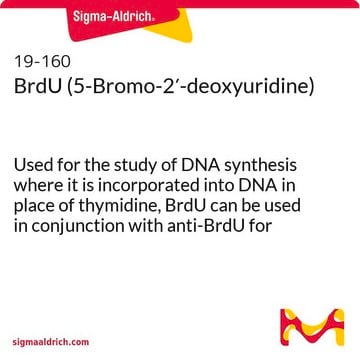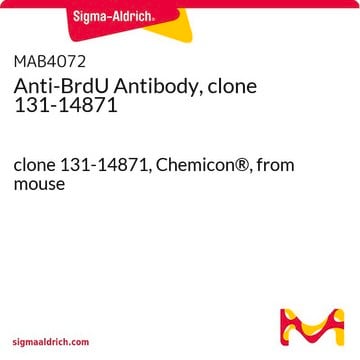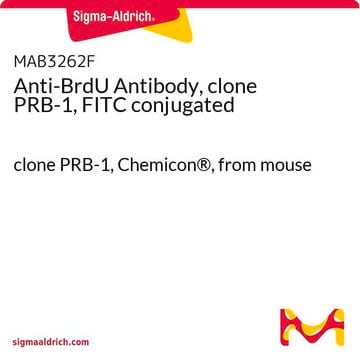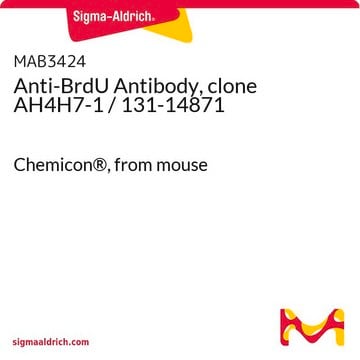B8434
Anti-BrdU antibody, Mouse monoclonal
clone BU-33, purified from hybridoma cell culture
Sinónimos:
Monoclonal Anti-BrdU antibody produced in mouse, Anti Brdu, Brdu Antibody, Brdu Antibody - Anti-BrdU antibody, Mouse monoclonal, Anti-Bromodeoxyuridine
About This Item
Productos recomendados
biological source
mouse
Quality Level
conjugate
unconjugated
antibody form
purified from hybridoma cell culture
purified immunoglobulin
antibody product type
primary antibodies
clone
BU-33, monoclonal
form
buffered aqueous solution
species reactivity
wide range
packaging
antibody small pack of 25 μL
concentration
~1.5 mg/mL
technique(s)
immunocytochemistry: suitable
immunohistochemistry (formalin-fixed, paraffin-embedded sections): 1-2 μg/mL using sections of intestine from mice or rats treated in vivo with BrdU
isotype
IgG1
shipped in
dry ice
storage temp.
−20°C
target post-translational modification
unmodified
¿Está buscando productos similares? Visita Guía de comparación de productos
General description
Anti-BrdU antibody, Mouse monoclonal (mouse IgG1) is derived from the BU-33 hybridoma produced by the fusion of murine myeloma cells and splenocytes from BALB/c mouse immunized with bromodeoxyuridine (BrdU) conjugated to KLH.5′-Bromo-2-deoxyuridine (BrdU) staining is predominantly used to observe the multiplication of tumor cells and other tissues in vivo.
Specificity
Immunogen
Application
- BrdU labeling
- immunohistochemistry
- immunostaining
- BrdU assay
- to detect 5-fluorouridine-labelled RNA
- to detect 5-bromo-2′-deoxyuridine (BrdU) labelled immunoreactive cells
- against BrdU labelled rat retinal sections
Physical form
Storage and Stability
Disclaimer
¿No encuentra el producto adecuado?
Pruebe nuestro Herramienta de selección de productos.
Storage Class
12 - Non Combustible Liquids
wgk_germany
WGK 1
flash_point_f
Not applicable
flash_point_c
Not applicable
Certificados de análisis (COA)
Busque Certificados de análisis (COA) introduciendo el número de lote del producto. Los números de lote se encuentran en la etiqueta del producto después de las palabras «Lot» o «Batch»
¿Ya tiene este producto?
Encuentre la documentación para los productos que ha comprado recientemente en la Biblioteca de documentos.
Los clientes también vieron
Nuestro equipo de científicos tiene experiencia en todas las áreas de investigación: Ciencias de la vida, Ciencia de los materiales, Síntesis química, Cromatografía, Analítica y muchas otras.
Póngase en contacto con el Servicio técnico











